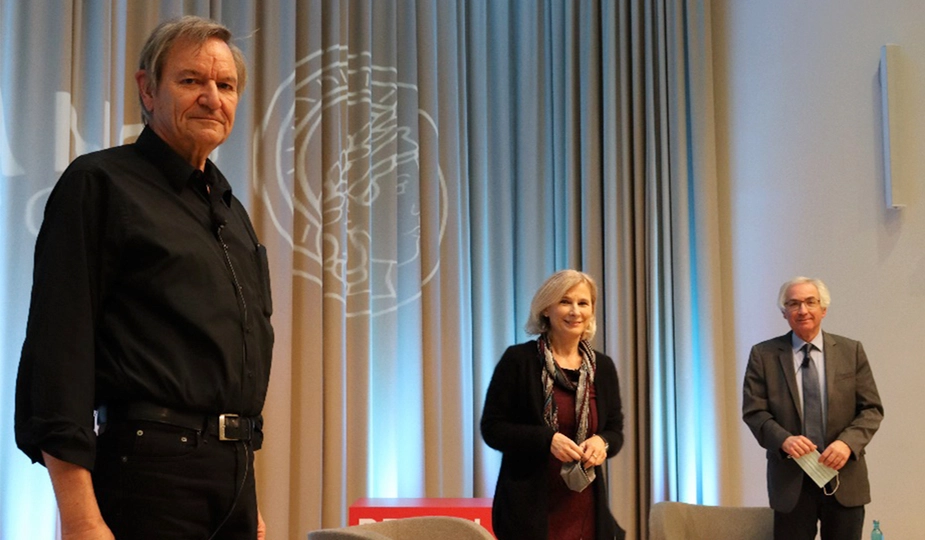FAIRmat: Lifting the treasure trove of materials data
Consortium led by HU professor Claudia Draxl aims to facilitate access to materials science data
The FAIRmat consortium, led by Claudia Draxl, Professor at the Humboldt-Universität, is one of the projects selected today by the Joint Science Conference (GWK) in a multi-stage competition for the National Research Data Infrastructure (NFDI). The project will receive funding to set up an infrastructure that helps making materials science data FAIR: Findable, Accessible, Interoperable, and Reusable. This will enable researchers in Germany and beyond to store, share, find, and analyze data over the long term. During the five-year term, a total of 60 PIs from 34 German institutions will work together in the FAIRmat consortium.
Prosperity and lifestyle of our society are very much governed by achievements of condensed-matter physics, chemistry, and materials science, because new products for the energy, environment, health, mobility, IT sectors, for example, largely rely on improved or even novel materials. The enormous amounts of research data produced every day in this field therefore represent the treasure trove of the 21st century. This treasure trove is, however, of little value, if these data are not comprehensively characterized and made available. How can we refine this feedstock, in other words, turn data into knowledge and value? For this, a FAIR data infrastructure is a must.
Here is where FAIRmat (“FAIR Data Infrastructure for Condensed-Matter Physics and the Chemical Physics of Solids”) comes in, a consortium led by HU Professor and IRIS Adlershof member Claudia Draxl. By building a FAIR research-data infrastructure for the noted fields, the consortium will lift the treasure trove of materials data, and therewith contribute to a disruptive change in in the way science and R&D are conducted. It will help the active researches without creating unnecessary bureaucratic burden. In addition to HU Berlin, the Leibniz-Institut für Kristallzüchtung (IKZ), the Max Planck Institute for Chemical Energy Conversion (MPI CEC), the Fritz Haber Institute of the Max Planck Society (FHI), the Technical University of Munich (TUM), the Karlsruhe Institute of Technology (KIT), and the association FAIR-DI e.V. are involved in the project as co-applicants.
FAIRmat Deputy Spokesperson Matthias Scheffler from the Fritz Haber Institute of the Max Planck Society explains: “We interpret the acronym FAIR in a forward looking way: Research data should be Findable and Artificial-Intelligence Ready. This new perspective will advance scientific culture and practice."
FAIRmat is a consortium of the National Research Data Infrastructure (NFDI). The NFDI is a nationwide network that is currently being established and funded with up to 90 million EUR per year from 2019 to 2028 by Germany’s federal and state governments to systematically manage scientific and research data. The fact that Humboldt-Universität is playing a leading role in setting up this significant infrastructure is something Peter Frensch, Vice President for Research at Humboldt-Universität zu Berlin, is proud of: “With the NOMAD HUB – the NOMAD Data Center at HU Berlin, we are already preparing the headquarter of the fundamental materials-science component of the NFDI infrastructure here in Berlin.”
FAIRmat covers a wide range of research fields in physics and related areas, consequently basic concepts and measuring techniques, working style, and research data are extremely diverse and heterogeneous. This renders the need for a FAIR data infrastructure as extremely pressing. FAIRmat promotes the efficient sharing of research data (sharing is caring!) and its preparation for reuse and analysis by Artificial Intelligence (AI) tools, enabling a new level, a new quality of science.
For this, FAIRmat follows a bottom-up approach, which is oriented towards the needs of scientists. The consortium is already receiving great support from the community, being well integrated into the Condensed Matter Section of the German Physical Society, the Max Planck Society (e.g., Big-Data Network, CPTS), a large number of universities and institutes as well as various international activities (for example RDA, GO FAIR, EOSC). FAIRmat is based on Claudia Draxl’s and Matthias Scheffler's extensive experience with the world's largest computational materials science data infrastructure, the Novel Materials Discovery (NOMAD) Laboratory, which is online since 2014.
“Naturally, we are now looking for highly motivated researchers from domain sciences and IT who share the enthusiasm for a paradigm shift in the fundamental materials science to strengthen our team and realize the FAIRmat principles together with us”, says Claudia Draxl. You can watch her welcoming video here: www.fair-di.eu/fairmat
To find out more about FAIRmat, visit www.fair-di.eu/fairmat
To join the FAIRmat team, visit nomad-lab.eu/career
To find out more about the NFDI, visit www.dfg.de/nfdi/en
Contact:
Prof. Dr. Claudia Draxl
Department of Physics / IRIS Adlershof
Humboldt-Universität zu Berlin
Phone +49 30 2093-66363
Email claudia.draxl(at)physik.hu-berlin.de
sol.physik.hu-berlin.de
Press release HU Berlin, 2 July 2021
